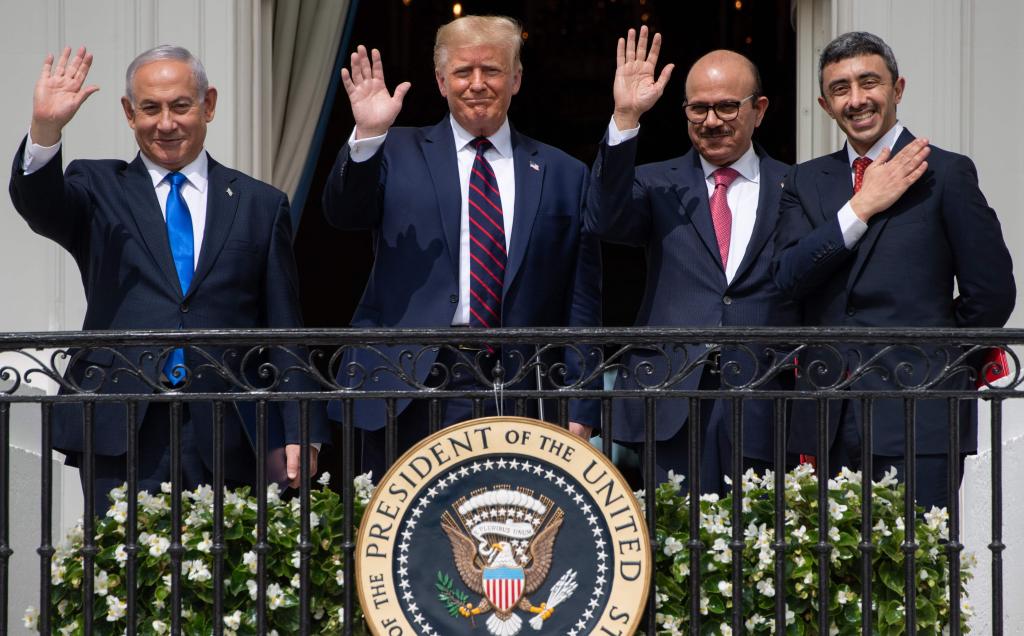Donald Trump made Israel’s triumph over Hamas much more likely


Israel’s army chief and prime minister made clear this week that Israel has only one New Year’s Resolution on the table: destroying Hamas.
Prime Minister Benjamin Netanyahu stressed that the ongoing operation in Gaza was “not close” to over.
Tragic as this just war is, it’s a bit of a miracle that Israel can wage it for so long. And that traces back to Donald Trump.
Given his utter lack of diplomatic finesse, ex-President Trump never had the look of an international peacemaker, let alone one who’d do wonders for Jews.
Those of us observing from Canada or across other allied nations could never have predicted it, but it turns out the Abraham Accords negotiated under Trump have made Israel’s continued existence and gradual triumph in this new war dramatically more likely.
Recall that in 2016 the new Republican administration inherited a stagnant Middle East peace scenario.
Since Israel’s founding, the conflict has essentially been the story of a democratic Israel ring-fenced by antagonistic Arab states who feigned empathy for Palestinians while using them as a tool to undermine Israel’s legitimacy.
These states even refused to recognize Israel’s right to exist.
With the leadership of senior adviser and Trump son-in-law Jared Kushner, the Trump White House tried a new “outside-in” approach to Mideast peace.
The Abraham Accords are proving to be a singular diplomatic triumph for the United States, and a godsend for Israel.
In August 2020, they provided for a gradual normalization of relations between Israel and the United Arab Emirates, Bahrain, Sudan and Morocco.
They also ignited rapid improvements in strategically significant relationships between Israel and Jordan, Egypt and Saudi Arabia — all at one time adversaries of the Jewish state.
As a result, they did more than any other presidential initiative to ensure that 2023 is not a replica of the 1967 war, when Israel was attacked on multiple fronts not merely by proxy terror groups like modern day Hamas or Hezbollah, but by a coalition of recognized Arab states.
Today, with the Accords in place, there’s simply too much for all sides to lose in an expansive conflict — like the 4 million new jobs and $1 trillion in new investment on the table if the accords are fully leveraged through 2030, per the Hoover Institute.
Militarily, the Accords and ensuing normalization of relations have given Israel the geopolitical space it needs to prosecute a large-scale operation to crush Hamas without a greater risk of inter-state conflict.
A long campaign and rising civilian death toll in Gaza may test the strength of the pacts, given strong sympathies with Palestinians in the Arab street, but, according to sources in the region, most actors seem open to continued normalization after Israel’s major campaign ends.
In fact, in a sad twist of irony, it looks like the Biden administration — not the Arab states living cheek-by-jowl next to Israel — is the biggest risk to Jerusalem’s ability to prosecute its just war for as long as it takes.
Biden’s secretary of state, Anthony Blinken, told Bibi on Nov. 30 that Israel doesn’t “have the credit” for a months-long war that reaches into southern Gaza.
It’s unclear whether Blinken was referring to global goodwill or the willingness of the United States to support such operations, but it ultimately doesn’t matter.
Blinken’s comments are a clear signal that, under President Biden, the United States will help Israel kill some terrorists, but maybe not all of them, lest it get awkward for onlookers.
This is a ridiculous proposition when it’s so evident Hamas must be crushed for both Israelis and innocent Palestinians to have a shot at peace.
The gradual withdrawal of US support for Israel’s just war against Hamas, sadly echoed in Canada, stands in stark contrast with the relative silence on the part of the Arab states.
Before the Abraham Accords, there would’ve been antisemitic rhetoric and potentially lethal interference from these states.
Their relative restraint — rhetorically, diplomatically and militarily — in the current conflict is breathtaking and novel in modern Mideast history.
Canada’s foreign minister, Melanie Joly, recently articulated a vision anchored in “pragmatic diplomacy,” which boils down to engaging with enemies as well as allies, with the great risk of confusing them for one another.
In contrast, by focusing on making good business deals between states, Team Trump showed what real pragmatic diplomacy means — and the massive strategic benefit it can yield for the West’s democratic friends and allies.
Matthew Bondy is a senior fellow with the Macdonald-Laurier Institute.







